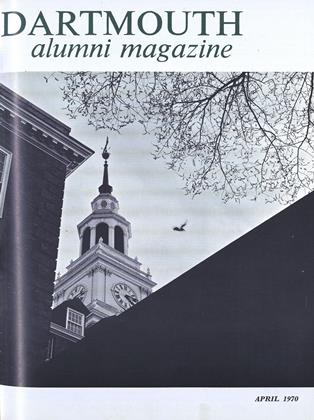By George W. Hilton '46. Bloomington:Indiana University Press, 1969. 262 pp.$7.95.
Prof. George W. Hilton presents a comprehensive, interesting, and provocative treatment of administrative experience under the 1958 amendments to the statutory charter of the Interstate Commerce Commission. Congress had acted chiefly to relieve the economic distress of the railroads and to improve their competitive position. Of first importance was the revision of the rule of ratemaking in situations involving competition for traffic among the rival modes of transport. Taking the rather narrow view that the inception of railroad regulation was nothing more than the creation of a vast cartel, the author bears down on the unfortunate "umbrella" ratemaking proclivity of the ICC since attaining authority over all surface modes. Despite an inept wording of the revised ratemaking rule that perpetuates its ambiguity, the guideline has been a qualified success in that the railroads have been accorded greater freedom in making rate reductions and have held their own somewhat better.
The future usefulness of the 1958 enactment is seriously threatened, however, by the recent judicial support given to the ICC's misguided effort to protect barge and truck lines by using fully distributed cost as a basis for comparisons in rate cases and treating railroad price-cutting as a predatory device— The secular decline of the rails in spite of significant technological advances suggests that rival modes need not fear the reestablishment of a railroad monopoly.
Authorizing control over the discontinuance of passenger trains served a useful social purpose in helping to accelerate the decline of passenger service. But Hilton finds the ICC at fault for not recognizing the hopelessness of the passenger business and being more lenient in allowing train withdrawals. Although writing before the favorable response to the current high-speed train service between New York and Washington, he predicts the complete extinction of the passenger train in the 1970'5. He does acknowledge some external benefits in the New York region, but rejects any subsidy of intercity passenger service as a "particularly pointless expenditure of public funds."
Hilton is highly critical of two of the remaining provisions relating to guaranties of loans to railroads and the extension of control over motor carriers. He believes they basically work against market forces in the allocation of productive resources. Granting guaranties of loans was most inappropriate for a declining industry since the policy objective should have been to facilitate disinvestment. Tightening control over motor carriers, especially the restoration of control over the carriage of frozen foods and the putting down of cut-rate operators by the ICC, is characterized as an undesirable extension of cartelization.
To try to improve the present system of transport regulation by such measures as eliminating rate bureaus or minimum rate control is to engage in fruitless tinkering in Hilton's opinion. He calls for the abolition of the ICC and the enforcement of the conventional policy of competition. One can be in complete agreement with the desirability of deregulating and relying more heavily on competitive forces. But there is no assurance that the oligopolistic market structure and the unevenness of competition, which will still prevail in the absence of all regulation, will yield welfare results markedly superior to those currently achieved.
Mr. Lindahl is Professor of Economics Emeritus, having retired in 1968.
 View Full Issue
View Full Issue
More From This Issue
-
 Feature
FeatureThe Dilemma of World Power
April 1970 By GENE M. LYONS, -
 Feature
FeatureRevival of the M.D. Degree
April 1970 -
 Feature
FeatureTHE KEMENY INAUGURATION
April 1970 -
 Feature
FeatureThe National Scene
April 1970 -
 Article
ArticleThe Faculty
April 1970 By WILLIAM R. MEYER -
 Class Notes
Class Notes1935
April 1970 By RICHARD K. MONTGOMERY, GEORGE PRICE
Books
-
 Books
BooksFaculty Publications
March 1934 -
 Books
BooksFaculty Articles
February 1956 -
 Books
BooksFIFTY SIX DARTMOUTH POEMS.
MAY 1972 By DOROTHY BECK -
 Books
BooksBriefly Noted
MAY 1969 By J.H. -
 Books
BooksALUMNI PUBLICATIONS
August, 1925 By James F. Colby, H. D. Foster -
 Books
BooksTHE EVOLUTION OF A MEDICAL CENTER: A HISTORY OF MEDICINE AT DUKE UNIVERSITY TO 1941.
NOVEMBER 1972 By WILLIAM L. WILSON '34

